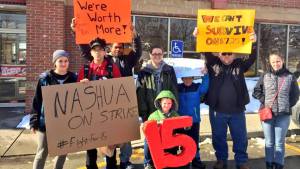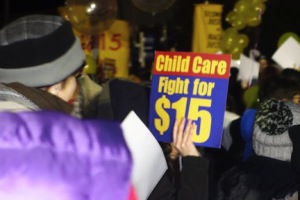
On February 6, low wage fast food workers in New Hampshire struck for the first time, joining many of their co-workers across the nation demanding $15 per hour and union rights.
The strike took place leading up to the Republican party primary presidential debate set to happen at St. Anselm college in Manchester, New Hampshire. Working with the Service Employees International Union (SEIU) low wage workers have been organizing strikes, protests, and rallies in coordination with the presidential debates to force politicians to pay attention to their demands.

One of the chants of the rally “Live Free or Die! Can’t Survive on $7.25!” combines the state of New Hampshire’s slogan and the class reality for almost half of the state’s workers.
According to Bureau of Labor data, approximately half of the state’s workers, about 281,000 people, make less than $15 an hour, what amounts to 45 percent of New Hampshire’s workers. In addition, as reported by the National Employment Law Project 42 percent of US workers are paid less than $15 an hour and women and people of color are over-represented in this group. There are 64 million workers in the U.S making less than $15 an hour while, according to the Social Security Administration 51 percent of working Americans make less than $30,000 a year.
As one participant in the rally, Sara Hussain pointed out “The workers are people of color, women of color, they’re bilingual, they’re immigrants, they’re the working class,” noting the growing multinational, multilingual U.S. working class. She elaborated, “Contrary to what Hillary Clinton said, $12 is not enough.”
Under capitalism the bosses get richer and the poor get poorer despite increases in production and profits. The labor of women and people of color labor is super-exploited to fatten the pockets of the super wealthy. The Fight for $15, a grassroots movement led by workers and supported by unions and their allies, is fighting not only for a raise but also for union rights. As one participant in the rally, Brad Rothrack of Interfaith Worker Justice said, “Once you fight for $15 and you get it, you need something to enforce that and continue to fight, that’s why the union rights demand is important.”
Another demonstrator, Sara Hussain, added, “A union fights for workers’ rights, for adequate income, healthcare benefits, workplace harassment, etc. These workers are parents and several of them are immigrants, who have come to the U.S. because of the results of neo-colonialism. They need a union to ensure that their demands for a $15 minimum wage, better hours and benefits are met and secured because corporations are not looking out for them.”
When asked about his thoughts on the connections between racism and the exploitation of the working class, former fast food worker and current Home Depot worker Abdias Maleus, a lively chant leader, had this to say:
“When you make low wages and you are a Black person or a minority you are targeted by law enforcement more often than not. When you get stopped and frisked and if you get arrested you can’t afford bail most times. You can’t afford a decent lawyer so you are forced to take what the state gives you – a lawyer who is tied up with the judges and the cops. We can’t afford decent representation because we make slave wages. So we are out here demanding and not begging, because like Malcolm X said there is no dignity in begging your oppressor for anything, if you want it you demand it and take it.”
Maleus went on further to highlight the challenging working conditions of low wage workers:
“The thing with the conditions in these jobs is that there are hidden tasks that aren’t apart of the job description. Like one time I had to clean up a bathroom after someone overdosed in the bathroom at Dunkin’ Donuts and law enforcement had to be called. The overall oppression we all face lingers in our workplaces and leaves us with so much extra work to do.”
Many of the workers realize the importance of working class solidarity and the role of unions in defending gains and reforms won through class struggle. At a time when unions, organizations of working class power, are under attack from neoliberal capitalism many union members came out to show solidarity with the striking fast food workers.
The 1199 SEIU (Service Employees International Union) and the SEIU Afro American Caucus, United Auto Workers, and union activists and organizers stood with their sisters and brothers chanting “What do we want!? 15! When do we want it!? NOW! And if we don’t get it!? SHUT IT DOWN!” in addition to “The Workers United Will Never Be Defeated!”
Such moments of solidarity coming from established unions and their rank and file are needed when union membership has declined to 11.1 percent as of 2015. The tactic of the strike, involvement of already established unions, and the militant protest point to rising militancy among the U.S. working class leading up to the 2016 presidential elections.
Other sections of the working class that also make under $15 an hour displayed solidarity with the action such as home care, childcare, and airport workers. Due to the right and left arm of capitalist exploitation, sexism and racism, many women and people of color are forced into low wage jobs while the cost of living skyrockets.
In addition the demands for raising the minimum wage and getting union rights were calls for affordable childcare, quality long-term care, and comprehensive immigration reform.
All of these demands, which could be met within capitalism, lighten the exploitation of the working class and puts them in a better position to strike back against the bosses and capital. As one New Hampshire union leader Doug Alden put it “People need more money in their pockets. They’re trying to get out of poverty. They’re trying to feed their kids, trying to have a job where they have some stability. And that’s what this movement is all about.”






